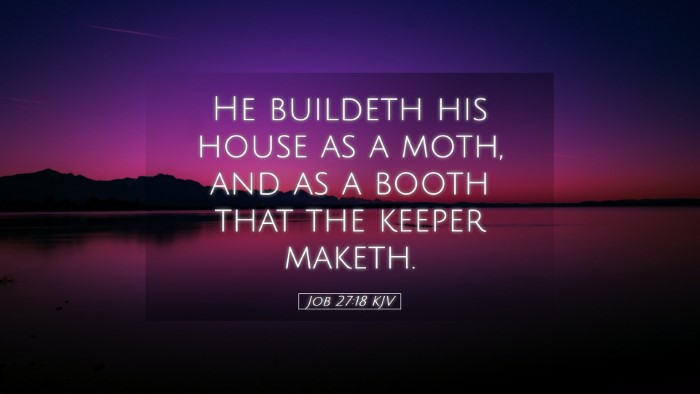Old Testament
Genesis Exodus Leviticus Numbers Deuteronomy Joshua Judges Ruth 1 Samuel 2 Samuel 1 Kings 2 Kings 1 Chronicles 2 Chronicles Ezra Nehemiah Esther Job Psalms Proverbs Ecclesiastes Song of Solomon Isaiah Jeremiah Lamentations Ezekiel Daniel Hosea Joel Amos Obadiah Jonah Micah Nahum Habakkuk Zephaniah Haggai Zechariah MalachiJob 27:18
Job 27:18 KJV
He buildeth his house as a moth, and as a booth that the keeper maketh.
Job 27:18 Bible Commentary
Commentary on Job 27:18
Introduction
Job 27:18 states, "He builds his house as a moth, and as a booth that the keeper makes." This verse captures Job's strong assertions about the fate of the wicked and the transient nature of their apparent prosperity. Various public domain commentaries provide insights into the nuances of this verse, shedding light on Job's perspective regarding the fate of the ungodly and the ultimate justice of God.
Overview of Job's Discourse
In this chapter, Job continues his response to his friends while affirming his integrity. Job's speeches throughout this section are characterized by a poetic assertion of truth against the backdrop of his suffering. The statement in Job 27:18 specifically contrasts the transient achievements of the wicked with the enduring nature of righteousness.
Contextual Analysis
Matthew Henry's Commentary further emphasizes the need to understand this verse within the broader themes of the book of Job.
- Nature of Wealth: Henry highlights the analogy Job uses to describe the wealth of the wicked as unstable and ephemeral, comparing it to a moth, which quickly crumbles and is destroyed.
- Booth Imagery: The reference to a "booth" indicates that the wicked’s prosperity is temporary, much like a temporary dwelling that lacks permanence.
- Divine Justice: Job asserts that God does not bless the wicked to the end, and their harsh reality is a testimony of divine justice.
The Ephemeral House of the Wicked
Albert Barnes' Commentary amplifies the thoughts surrounding the metaphor of a house built as a moth and a booth:
- Moth as a Symbol: Barnes interprets the moth as a representation of insignificance and frailty, suggesting that material possessions of the wicked may flourish temporarily but ultimately lead to ruin.
- Booth as a Reflection: The booth refers to temporary structures, symbolizing the impermanent nature of the wicked's fortune, reflecting instability and lack of true foundation.
Lessons on Prosperity and Temporal Wealth
Adam Clarke's Commentary offers a theological reflection on the lesson Job imparts through this verse:
- Transient Prosperity: Clarke details that while the wicked may seem to prosper, the reality is that their wealth is fleeting and does not endure through generations.
- Contrast with the Righteous: He encourages believers to look beyond visible circumstances, affirming that righteousness has an eternal value that worldly wealth cannot achieve.
- Call to Reflection: The statement serves as a reminder for readers to evaluate what they consider valuable and to pursue that which has lasting significance in their pursuits.
Theological Implications
This verse and the associated commentaries compel the reader to wrestle with key theological concepts:
- Nature of God's Justice: A fundamental theme in Job is the nature of divine justice. This verse challenges the surface understanding of prosperity as evidence of blessing.
- Understanding Suffering: Job's articulations resonate with those who experience suffering and injustice, reassuring them that present struggles do not discount future restoration and hope.
- The Eternal Perspective: The transitory aspect of earthly life as portrayed in this verse nudges believers toward an eternal perspective, emphasizing investment in spiritual growth over material accumulation.
Pastoral Applications
From this text, several pastoral insights can be drawn:
- Teaching on Wealth: Pastors can leverage these insights to educate congregants about the temporary nature of earthly riches and encourage them to focus on eternal investments.
- Encouragement in Suffering: Reminding those who suffer of the wisdom found in Job can provide comfort and perspective concerning their trials.
- Call to Integrity: Use Job’s reaffirmation of integrity as a call to live honorably before God, regardless of the circumstances that may tempt a deviation from righteousness.
Conclusion
Job 27:18 poignantly encapsulates the essence of a life built on the foundation of faith versus one built on the fleeting pleasures of sin. Drawing from the profound insights provided by Henry, Barnes, and Clarke, the message remains clear: the pursuit of righteousness yields eternal dividends, while the pursuit of earthly wealth is ultimately hollow and unsustainable. This truth stands as a testament not only to the wisdom of Job amidst his suffering but also as a source of enduring hope for all who seek to navigate their faith in a world often defined by materialistic values.


